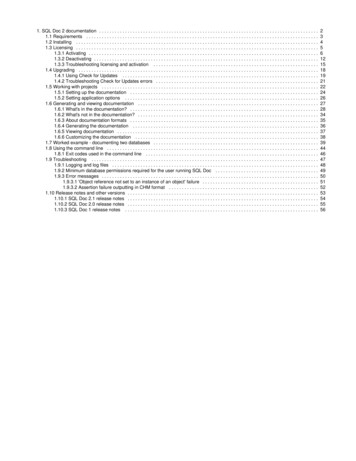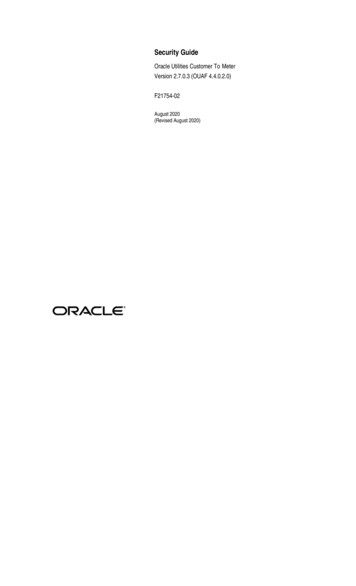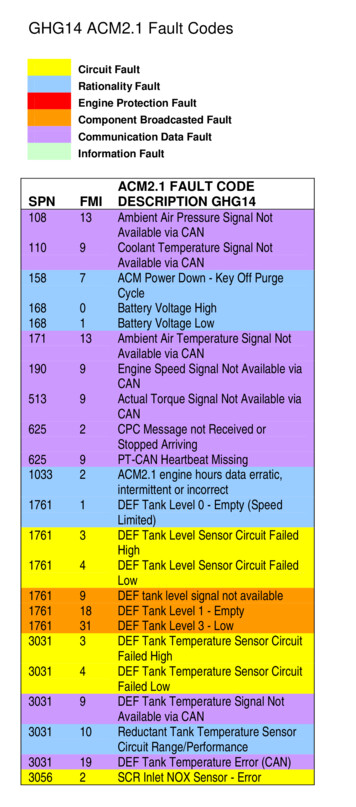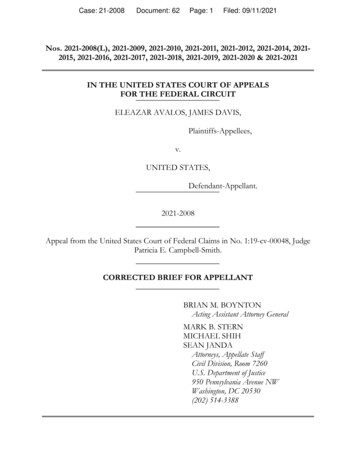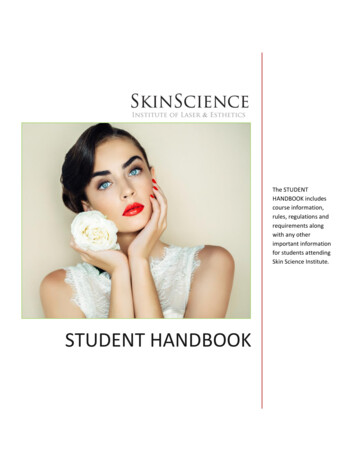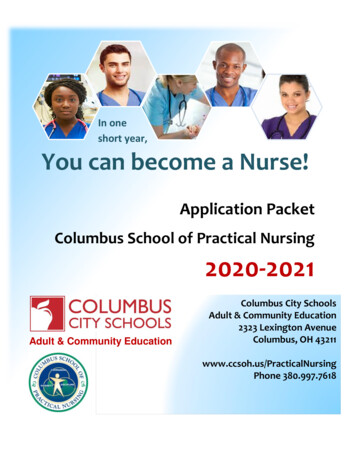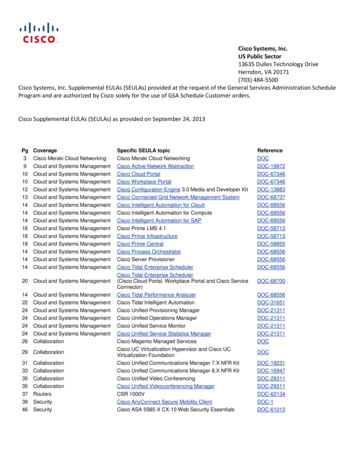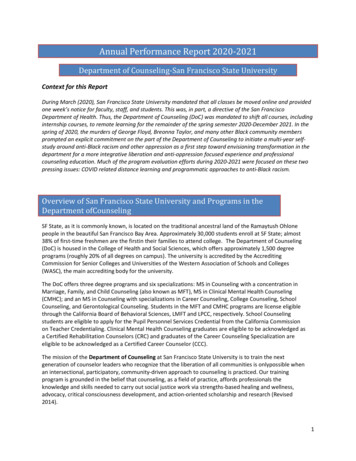
Transcription
Annual Performance Report 2020-2021Department of Counseling-San Francisco State UniversityContext for this ReportDuring March (2020), San Francisco State University mandated that all classes be moved online and providedone week’s notice for faculty, staff, and students. This was, in part, a directive of the San FranciscoDepartment of Health. Thus, the Department of Counseling (DoC) was mandated to shift all courses, includinginternship courses, to remote learning for the remainder of the spring semester 2020-December 2021. In thespring of 2020, the murders of George Floyd, Breonna Taylor, and many other Black community membersprompted an explicit commitment on the part of the Department of Counseling to initiate a multi-year selfstudy around anti-Black racism and other oppression as a first step toward envisioning transformation in thedepartment for a more integrative liberation and anti-oppression focused experience and professionalcounseling education. Much of the program evaluation efforts during 2020-2021 were focused on these twopressing issues: COVID related distance learning and programmatic approaches to anti-Black racism.Overview of San Francisco State University and Programs in theDepartment ofCounselingSF State, as it is commonly known, is located on the traditional ancestral land of the Ramaytush Ohlonepeople in the beautiful San Francisco Bay Area. Approximately 30,000 students enroll at SF State; almost38% of first-time freshmen are the firstin their families to attend college. The Department of Counseling(DoC) is housed in the College of Health and Social Sciences, which offers approximately 1,500 degreeprograms (roughly 20% of all degrees on campus). The university is accredited by the AccreditingCommission for Senior Colleges and Universities of the Western Association of Schools and Colleges(WASC), the main accrediting body for the university.The DoC offers three degree programs and six specializations: MS in Counseling with a concentration inMarriage, Family, and Child Counseling (also known as MFT), MS in Clinical Mental Health Counseling(CMHC); and an MS in Counseling with specializations in Career Counseling, College Counseling, SchoolCounseling, and Gerontological Counseling. Students in the MFT and CMHC programs are license eligiblethrough the California Board of Behavioral Sciences, LMFT and LPCC, respectively. School Counselingstudents are eligible to apply for the Pupil Personnel Services Credential from the California Commissionon Teacher Credentialing. Clinical Mental Health Counseling graduates are eligible to be acknowledged asa Certified Rehabilitation Counselors (CRC) and graduates of the Career Counseling Specialization areeligible to be acknowledged as a Certified Career Counselor (CCC).The mission of the Department of Counseling at San Francisco State University is to train the nextgeneration of counselor leaders who recognize that the liberation of all communities is onlypossible whenan intersectional, participatory, community-driven approach to counseling is practiced. Our trainingprogram is grounded in the belief that counseling, as a field of practice, affords professionals theknowledge and skills needed to carry out social justice work via strengths-based healing and wellness,advocacy, critical consciousness development, and action-oriented scholarship and research (Revised2014).1
The DoC admits students for the Fall semester of each year (no Spring admissions). Students take coursesin the Fall and Spring semesters either on a part-time or full-time basis. Classes are held Monday throughThursday during daytime and evening (9:30am – 10:00pm). No classes are offered on Fridays as this tendsto be a day when students go to their internship sites. The program has been taught almost entirely inperson, however in March 2020, the Department of Counseling transitioned all programs and courses toonline instruction for the health and safety of our students, faculty, staff and university community untilsuch time as it is safe to return to in person instruction. During the 2020-2021 academic year, all graduatecourses in the Department of Counseling were taught online.The DoC has over 200 internships throughout the Bay Area, in schools, colleges, universities, communityorganizations, governmental organizations, among others. One example is the Peggy H. Smith CounselingClinic, located on campus in Burk Hall, and jointly sponsored with SF State’s Counseling and PsychologicalServices. The DoC has many established internships in non-profits and the schools that offer College, Career,School, MFT, and CMHC internships including RAMS, Inc., San Francisco Unified School District, OaklandUnified School District, Berkeley Unified School District, University of California at Berkeley, University of SanFrancisco, San Francisco State University, Skyline College, City College of San Francisco, among others.The DoC seeks to mentor and foster leadership in the new generation of counselors as well as engagestudents to participate in the Department. The Counseling Student Association is a vibrant and committedstudent organization that plans and hosts meaningful community buildingevents and advocates for studentissues. Students inthe department participate actively in Chi Sigma Iota, the national counseling honorssociety, which brings students together and emphasizes service to the community.Brief Accreditation History and Leadership in the Profession of CounselingIn October 2018, the Department of Counseling (DoC) celebrated 70 years providing counselor education atthe graduate level and helping to meet the mental health and educational needs of communities, families,and individuals. For many years, the Department of Counseling has been CACREP-accredited in MFT,School, College, Career, and Gerontological Counseling as well asCORE accredited in RehabilitationCounseling. The DoC was the first accredited CACREP program in Career Counseling and in GerontologicalCounseling. The Clinical Mental Health Counseling Program (formerly Rehabilitation and ClinicalRehabilitation & Mental Health Counseling) became CACREP-accredited on July 1, 2017. Accreditation ofthe Gerontological Counseling program expired in 2019 at which time, CACREP ceased accrediting allGerontological programs. The other five programs in the Department of Counseling (Career Counseling;Clinical Mental Health Counseling; College Counseling Marriage, Family, and Child Counseling; and SchoolCounseling) are accredited by CACREP under a two-year accreditation until March 31, 2022 at which timethey will be eligible for an additional 6 years of accreditation.The Department of Counseling has had a long and integral relationship to the counseling profession formany years as advocates for the profession and leaders in the profession’s development. In the earlyhistory of the department, former Department Chair Bill Evraiff wasone of the original developers ofCACREP as an outgrowth of ideas about counselor accreditation put forth by CACES.In addition to contributing to enhanced standards for the profession, historically and currently, ourdepartment has been involved with ACA, the leading professional association for counseling.For example,former faculty member Jim Winfrey served as President of ACES, WACES, and CACES. He was ACA treasurerfor two terms and ran for president of ACA. He was also a long time member of the ACA insurance Trust.Former DoC Chair and faculty member, Robert Chope also served as President of NECA, a division of ACA.Former faculty members Amy Hittner, Gerald West, and Andres Consoli all served as Presidents of WACES.2
During the very lengthy advocacy to establish counselor licensure in California, former faculty membersJohn Blando and Anita Leal-Idrogo were members of the Board for the Counselor Coalition for CounselorLicensure. Robert Chope and John Blando were instrumental in gettingthe LPCC legislation passed inCalifornia, an effort which took many years. Current faculty member Sandra Fitzgerald serves as CALPCCBoard Member and served as the President in 2020-2021. She was also founding member and Chair of theCALPCC BIPOC Fellows Program, Chair of the Continuing Education and Counselor Education Committee,Chair of the Conference Committee, and Chair of the Counselor Educator Consortium. We are proud of ourcentral and sustained role in getting counselor licensure in California.Current Department Chair Rebecca Toporek is an ACA Fellow, a founding member of Counselors for SocialJustice (a division of ACA) and was founding co-editor of the division’s journal serving for more than tenyears. She was an ACA Advocacy Task Force member and co-author of the ACA Advocacy Competencies(Lewis, Arnold, House & Toporek, 2002) which was just recently updated (Toporek & Daniels, 2018). Dr. ElifBalin is Co-Chair of the ACES International Faculty and Student Interest Network, Task Force member forthe revisions of the NCDA Minimum Competencies for Multicultural Career Counseling and Development,and Board member and Northern California Regional Coordinator for the California Career DevelopmentAssociation, a state branch of the NCDA. Drs. Patricia Van Velsor and Molly Strear are campus advisors forChi Sigma Iota, the international honors society for counselor education graduate students.3
About this Performance ReportThe Council for the Accreditation of Counseling and Related Educational Programs (CACREP) requires thatcounselor education program faculty annually report by program level (1) a summary of program evaluationresults; (2) subsequent program modifications; and (3) any other substantial program changes. This reportaddresses these three areas for the academic year 2020-2021. Given the immediate and necessary responseto COVID conditions, this report and the program evaluation data will include the DoC’s efforts to collect dataand subsequent program modifications based on those conditions. Further, the DoC’s initiation of an antiracism self-study and the preliminary assessment associated with that is included. This initiative is a multiyearprocess, and most assessment results are not yet available at the time of this writing. The 2021-2022Performance Report will include a more thorough review of that data.Program Evaluation ResultsThe program evaluation process includes analysis of data including student demographics, graduation andretention, student assessment, and student feedback regarding their experience inthe program.Assessment of Student Demographics, Retention and GraduationStudent Enrollment 2020-2021CACREP-AccreditedProgramCareer Counseling# of StudentsEnrolled6% of StudentsEnrolled4.3%GenderClinical Mental Health Counseling2316.7%MaleClinical Rehabilitation and Mental Health21.4%Female 74.4%College Counseling2417.5%Marriage, Family, and Child Counseling5540.1%School Counseling2618.9%Total Number of Students13798.8%25.5%Nonbinary*99.9%* A non-binary gender option was by the university in 2019 and we know there are students in the program whoidentify as non-binary. It is unclear why that is not indicated in the data report from the university.Data for this table comes from the Office of Institutional Research at San Francisco State University, StudentEnrollment Dashboard (ir.sfsu.edu/content/students-data).4
Ethnicity of Students 2020-2021Asian/ icIslanderAmericanIndianTwo or More Declined to Total # %Data for this table comes from the Office of Institutional Research at San Francisco State University, Student EnrollmentDashboard (ir.sfsu.edu/content/students-data).International Students: 3%May 2020 GraduatesDegreeGraduatesMay 2019GraduatesMay 2020GraduatesMay 2021Students Who LeftProgram 2020-2021M.S. in Counseling(Career, College,Gerontology, School)1721191M.S. in Counseling – Clinical MentalHealth Counseling39 (3 CRMHand 5 CMHC)81M.S. in Counseling – Marriage, Family,and Child Counseling15242413554513Total Number of GraduatesTime to Completion of Degree of May 2020 GraduatesTime to completion2 years3 years4 years5 years or moreTotalsNumber of students16 (31.3%)29 (56.8%)4 (7.8%)2 (3.9%)51Of the graduates, 65% pursued a specialization only; 35% pursued a specialization one emphasis. Anemphasis requires 2-3 additional classes and 480-700 hours of fieldwork associated with that emphasis.5
Student Assessment of Knowledge, Skills and Professional DispositionsDoC Student Assessment DataProgramSummary of 2020-2021 evaluation resultsProgram modificationsCareerCounselingKey Performance Indicators: All students met a minimum of a Due to COVID-19 context,faculty and students changed to“B” grade on all indicators.an online format in March 2019.Professional Readiness Behavior Rubric: All students metFaculty opened virtual spaces toexpectations for target behaviors.offer additional support tostudents.Supervisor Evaluations of Trainees: All trainees met orexceeded expectations by the end of the academic year.Clinical MentalHealthCounselingKey Performance Indicators: All students met a minimum of a Due to COVID-19 context,faculty and students changed to“B” grade on all indicators.an online format in March 2019.Professional Readiness Behavior Rubric: All students metFaculty opened virtual spaces toexpectations for target behaviors.offer additional support tostudents.Supervisor Evaluations of Trainees: All trainees met orexceeded expectations by the endof the academic year.CollegeCounselingKey Performance Indicators: All students met a minimum of a Due to COVID-19 context,faculty and students changed to“B” grade on all indicators.an online format in March 2019.Professional Readiness BehaviorRubric: All students metFaculty opened virtual spaces toexpectations for target behaviors.offer additional support tostudents.Supervisor Evaluations of Trainees: All trainees met orexceeded expectations by the endof the academic year.Marriage,Family, &ChildCounselingKey Performance Indicators: All students met a minimum ofa “B” grade on all indicators.Professional Readiness Behavior Rubric: All students metexpectations for target behaviors.Supervisor Evaluations of Trainees: All trainees met orexceeded expectations by the endof the academic year.SchoolCounselingKey Performance Indicators: With the exception of 4.0% ofstudents, all students met a minimum of a “B” grade on allindicators.Professional Readiness Behavior Rubric: All students metexpectations for target behaviors.Due to COVID-19 context,faculty and students changed toan online format in March 2019.Faculty opened virtual spaces tooffer additional support tostudents.Due to Covid-19 context, facultyand students changed to anonline format in March 2019.Faculty opened virtual spaces tooffer additional support tostudents.Supervisor Evaluations of Trainees: All trainees met orexceeded expectations by the endof the academic year.6
Student Assessment Data ThemesWith respect to student learning outcomes on key performance indicators, 99% of students successfully metCACREP expectations in the eight core areas, as well as in the students’ specialty areas. Student remediationfor student learning outcomes was needed in an internship course, specifically related to process notes,which may have been related to students’ heavy schedules in their last semester as they’re working atinternship sites and completing their culminating experience projects. With respect to the assessment ofstudents’ professional dispositions, no students were identified as needing remediation based on theProfessional Readiness and Behavior Rubric (PRBR).7
Program Evaluation: Student Perceptions and Programmatic Response: Data,Action and ModificationsDuring the 2020-2021 academic year, several methods were used to collect data from students and alumniregarding their experience in the program. Our assessment of student perceptions during this year focused onstudents’ experiences related to these two pressing issues: COVID related distance learning and programmaticapproaches to anti-Black racism. In addition, we chose to assess student and faculty perceptions of ourprofessional behavior rubric that had been in effect for three years. In an effort to reflect on that instrument, andgiven student feedback in earlier assessment processes, we deemed this to be an important focus of ourprogram evaluation. Finally, as always, we provide an online forum for students to view our draft of ourupcoming course schedule and provide input. We have not included that data here.1) Onboarding Process for New StudentsSurvey of Students’ Perspectives regarding Onboarding Process for New Students (Summer 2020)(n 12)This survey was a part of an effort to evaluate our new student orientation process and gather recommendationsfrom current students to inform the development of an extended summer orientation module series. The surveywas developed with a small team (two students and the Department Chair) focused on enhancing the orientationprocess for new students. The survey asked about readings and materials the participants believed wereimportant to share with incoming students and for the curriculum. The second part of the survey asked whatparticipants “wished they would have known before they started the program”. The survey was sent to thestudent listserv and, although the number of responses was small (n 12; 9% response rate), we value this dataand present the themes of the qualitative responses from participants. The results provided specific resourcerecommendations primarily focused on social justice and multicultural perspectives as well as critiques of whitedominant theorists and approaches as well as other more traditional readings on theoretical approaches. Amajor theme across 6 of the 9 participants focused on advocating for the inclusion of more critical race theoryacross all program courses as well as more “difficult discussion” regarding race and other current events in allclasses. Several participants emphasized the importance of fellow students as a resource to their peers and twoparticipants advocated for more structured opportunities for incoming students to develop relationships withpeers prior to starting the program. Two participants advocated for allowing students to determine their ownreading requirements and allowing students to fulfill requirements from outside the program, in “nonconventional pathways”, and independent projects. Several participants noted the need for more discussionabout social justice and how the department “works to commit to that mission” as well as how students canadvocate for change in the program. On a related note, one participant voiced that orientation should includediscussion about the “constraints” accreditation and licensure requirements place on a program related to“meeting their social justice mission” and how the program responds to those constraints. One participantsuggested that incoming students could be made aware of the opportunity the culminating project presents todeeply engage in an area of interest.Program Response to Student Data Regarding Orientation and Student Onboarding: Program ModificationsIn response to feedback from students suggesting a more lengthy orientation process and requests that thedepartment do more to prepare incoming students for engaging in a culturally sensitive and critical way, the DoCbegan a project in summer 2020 to develop a summer orientation module to augment the spring orientation dayprovided to admitted students. In the spring 2021, based on survey feedback and consultation with theCounseling Student Association, the department developed two additional (three total) summer orientationmodules (Modules 2-4) to augment the spring orientation and implemented those during summer 2021. Thetraditional spring orientation (Module 1) included general welcome followed by specialization group meeting and8
group advising as well as orientation to internship and fieldwork. Summer Module 2 focused on introducingstudents to a summer reading focused on self-awareness around racial identity (“The Racial Healing Handbook”)with a video and reflection questions. Summer Module 3 focused on Disability Justice presenting a video andtargeted readings. Finally, Module 4, provided an overview of the learning platforms, modes of communication inthe department, and resources for students. Feedback will be solicited from incoming students regarding thesemodules during fall 2021 to provide data to refine the modules in the following summer. In addition, during thespring 2021, the development of a student resource database was initiated to include financial resources, mentalhealth resources, housing resources, and professional resources. During the 2021-2022 academic year, this willbe refined and formatted for distribution to students. It will also be integrated into the orientation modules. Inaddition, given the most recent data, the next round of modules will integrate more “in person” opportunities.Although this was included in the first iteration of Modules (2020), it was poorly attended. Future attempts willneed to creatively structure the opportunity for maximum participation.2) Learning Modes for Fall 2021: Online, Hybrid or In PersonSurvey of Students’ Perspectives regarding Mode of Learning during COVID and requirements for distancelearning (Spring 2021)In weighing the health implications of returning to in person instruction during the continuing pandemic, multiplesurveys were used to solicit input from students regarding remote learning. The results of a survey (n 76; 57%response rate) in March 2020, assessing students’ preferences for learning modes in Fall 2021 indicated that55.4% preferred online classes, 15.4% preferred practicum and internship classes in person but all other classesonline, 12.3% preferred hybrid classes (some sessions in person and some online), and only 9.2% of studentspreferred all in person classes. The qualitative data indicated that health concerns were noted with the mostfrequency, followed by commuting and family concerns. The students who preferred in person noted a beliefthat physically being in person for clinical training was important. In relation to students’ perceptions of how theprogram and/or instructors managed teaching in the remote environment, some comments included affirmationof the quality of online instruction during this past academic year, “we’re all living proof that it can work, and theaccommodations are possible, practical, and do not dramatically reduce the quality of instruction/learning”.Alternative comments stressed the limitations of the online environment: “the zoom experience is taking awayfrom the learning”; “it feels harder to know how to name and address microaggressions in the virtual setting”.Program Response to Student Data Regarding Mode of Learning During COVID-19: Program ModificationsIn response to student data, as well as uncertainty of safety and progression of the virus, the Department ofCounseling determined that all Fall 2021 courses would be offered online. For pedagogical and accreditationreasons, the program intends to return to a face to face model as soon as health conditions allow. In planning forSpring 2022, another survey will be conducted to gather student and faculty input and that data will be used toadvocate with the university for offerings that best meet the needs of students, the learning objectives, andprovides opportunities for students to thrive in a vibrant and culturally responsive learning community.3) Process and Methods for Assessing Professional DispositionsStudent Evaluation Committee Survey regarding Professional Readiness Behavior Rubric (Spring 2021)The 2020-2021 marked the third-year review of the Student Evaluation Process and the implementation of theProfessional Readiness Behavior Rubric (PRBR). A survey was sent during the Spring of 2021 to students, lecturerfaculty and faculty to evaluate the Professional Readiness Behavior Rubric (PRBR) and the Student Evaluation9
Committee (SEC) process. A total of 54 people responded to the survey and the majority were students (43students, 4 lecturer faculty, and 7 tenure track faculty). The data showed that students and faculty need moreclarity about the reasons why we have the PRBR as a systematic evaluation tool and more instructors needed toexplicitly talk about the PRBR tool in their class. For example, 21 out of 36 respondents (55.26%) reportedinfrequency in the instructors’ explanation of the PRBR process and SEC in class. This finding is in sync withinstructors who report that they are “somewhat comfortable” (36%) and neither comfortable nor uncomfortable(27%) discussing the PRBR process with students in class. A majority of instructors (72%) reported that theydidn’t have time to do a more thorough assessment of students’ disposition and professional development.Program Response, Action and Modification to Data Regarding the Student Evaluation ProcessGiven the survey data from the Spring 2021 survey of students and faculty, as well as the SEC committee’scommitment to support students’ needs, we are conducting listening sessions in the Fall of 2021 to revise andrevisit the PRBR student evaluation process. Students, lecturer faculty, and faculty are invited to engage in thisprocess. The feedback received in the listening sessions will be used to begin a revision of both the tool and theprocess within the Department of Counseling.4) Anti-Black Racism Self-StudyAssessment of Student and Faculty Perceptions and Experiences in the Program Related to Anti-Black Racismand other OppressionBased on assessment results, anecdotal feedback, input from the Counseling Student Association and nationwideracial violence toward Black community members, the department initiated a multiyear self-study on itsperformance addressing anti-Black racism and other forms of oppression. In the spring of 2021, the departmentcontracted with an external consulting group to develop an assessment process including focus groups ofstudents of color, white students and faculty of color as well as surveys of alumni and students. Prior to theconsulting group’s work, the department requested input from students, via a survey, regarding what they wouldhope for from the consultants and the process used for assessing cultural climate. This was shared with theconsulting group who used that data when designing the assessment process. The consulting group completedthree student focus groups in April and May of 2021 and one targeted focus group of specific faculty members ofcolor. In addition, they distributed an online survey to recent graduates regarding their experience in theprogram specifically related to racism, counselor training and skill development related to racism, and theprogram’s effectiveness addressing these issues. The consulting group is scheduled to present their report to thedepartment in early October. These findings will be included in the 2021-2022 annual performance report. Inaddition, the department is planning to distribute an additional survey to current students in early October withreview of results in the Fall 2021 followed by additional consultation to develop a long-term plan to address theissues raised in the assessment process.ConclusionThe Department of Counseling is committed to continual improvement in its curriculum, hiring, studentsuccess and processes in an effort to address community needs for diverse, ethical and effective professionalcounselors. This commitment means that the department will continue to assess student, faculty andcommunity input and make necessary modifications. In some cases, this process will need to span severalyears, given the complex nature of the modifications and aspirations, for example, transitioning toward amore socially just and liberatory program. Over the next several years, the Annual Performance Report willcontinue to report on ongoing assessment and developments toward these and other goals.10
Department of Counseling-San Francisco State University Context for this Report During March (2020), San Francisco State University mandated that all classes be moved online and provided . SF State, as it is commonly known, is located on the traditional ancestral land of the Ramaytush Ohlone people in the beautiful San Francisco Bay Area .



